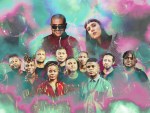The Mess is a new column from journalist Richard Villegas, who has been reporting on new, exciting sounds flourishing in the Latin American underground for nearly a decade. As the host of the Songmess Podcast, his travels have intersected with fresh sounds, scene legends, ancestral traditions, and the socio-political contexts that influence your favorite artists. The Mess is about new trends and problematic faves whilst asking hard questions and shaking the table.
We’re going there. We’re talking about it. Even if things get a little messy.
Happy Pride! The world is on fire. If you’re worried about how beloved parades and overpriced afterparties are being affected by our crumbling right to free assembly, cowering brands withdrawing sponsorships, and the rising flames of war, let me remind you that Pride was born as a riot. Don’t get me wrong; I’m not one of those sanctimonious keyboard warriors who think Pride should be a procession of solemn contemplation. On the contrary, I believe frolicking in slutty, camp gettups and freely loving each other in the face of those who hate us is one of the most powerful weapons LGBTQ+ people have at our disposal. And if you have to throw a brick to get the point across, I won’t snitch.
However, the rallying call of “fight for your rights” feels increasingly literal. This month marked the ninth anniversary of the Pulse Nightclub shooting, and while the sting of tragedy endures, things are getting more galling: Neo-nazis now show up to drag brunches in broad daylight and hate crimes are spiking at an alarming rate. Trans people — the most vulnerable members of our community — are being systematically targeted through barbaric legislation and madcap mandates, a spiteful pendulum swing towards conservative values that seeks sweeping erasure.

As our antagonists evolve, so must the voices we spotlight, which led me to a conclusion uncharacteristic for a gay writer during peak rainbow season: I won’t be talking about myself. Instead, I’m handing the mic directly to trans and gender non-conforming artists from across the continent to amplify the nuances of their artistic practices, personal expressions, and social contexts.
Mexican avant-folk musician La Bruja de Texcoco came through The Mess to reflect on her embrace of Oaxaca’s vibrant Muxe community, while Venezuelan travesti and perreo artist Yajaira la Beyaca highlighted the crucial balance between resistance and humor. In Chile, the singer-songwriter Sabales tracked his changing post-transition voice over the course of recording his first album, while New York vocalist and composer STEFA* spoke with Remezcla hours after receiving gender-affirming surgery. Finally, the Ecuadorian activist and journalist Runa Sanabria recounted challenges facing low-income and indigenous trans people in the Andean region, as well as the dangers of minor despots mimicking the Trump Administration’s unhinged antics.
Keep scrolling for these first-person accounts of hustle and resilience, and I’ve taken the liberty of curating a playlist stacked with trans and gnc artists to enrich your reading with sounds and stories breaking the binary.

La Bruja de Texcoco (She/Her)
“La Bruja is a journey of identity, of constantly rediscovering and reinventing myself through my art. Not just music, but also in acting and songwriting; in my identity as a trans woman; as Mexicana; as a brown-skinned person in a curvaceous body. It all holds enormous significance because showing myself as I am can help people like me feel free and secure when walking down the street. I am many things. I’m a futurist Mexica with a Wi-Fi connection.”
“I identify closest with Muxeidad. I’m not Zapotec by birth, so I’m not technically Muxe, but it’s a part of my life regardless. I’ve built great friendships and alliances with my trans, Muxe sisters, who are standard bearers of [Mexican] tradition. I also love and learn so much from the girls in the city, and even though society perceives [both experiences] as different, I feel sisterhood with all of them. As time goes by, I’ve learned that trans-femininity is much more than a visible trait. It’s about feeling.”
STEFA* (They/Them)
“‘Sin Genero’ in Spanish means without genre as well as without gender. I identify as both. When I made that connection, I realized my music was intrinsically tied to my history and my becoming. My music practice feels like deep, embodied research into where I’m from, where I want to go, who my tr/ancestors are, and how I honor them. My influences include euro-centric classical voice training, choral harmonies, punk sensibilities, electronic production, somatic grooves, intimate confessions, and past and future storytelling that center my brown, trans, working-class communities.”

“There’s a cis consensus that trans people’s top worries are pronouns and self-expression, when in reality it’s work precarity, lack of healthcare competency, and overall physical and emotional safety. Our elders have passed away far too young, sick, and struggling. We have fewer examples of trans role models because history has done everything in its power to erase our stories and stunt our legacies. If young trans people can’t see examples of long trans lives, it’s harder to imagine it for themselves. I pray I can be an example of someone living unabashedly in their expansive truth.”
“The DIY music, art, and experimental theater scene in NYC gave me purpose and community. Lily Wen of Figure & Ground Records helped shape my first EP, Sepalina, and supported me as co-producer of my full-length album Born With An Extra Rib. I collaborated with OHYUNG on the leading track off of Julio Torres’ feature film debut Problemista, and most recently, I’ve connected with San Cha and her queer team of visionaries to bring to life her diva punk opera, Inebria Me. Playing the villainous sister, Azalea, brought me back to a more classical voice and allowed me to tap into drag, wearing a 20-inch lace-front natural wig with a full beat. I never thought I’d access those parts of me without dysphoria or impostor syndrome, but being surrounded by queer, trans, and gnc artists allowed me to play again. I can’t wait to see what this next chapter unlocks for me, my spirit, my artistry, and my expression!”
“If young trans people can’t see examples of long trans lives, it’s harder to imagine it for themselves.”
Yajaira La Beyaca (She/They)
“Amor, you’re just born with someffin. I was always the most kreative and artistiq loka in my world. Yajaira was born on Twitter over 10 years ago. She beqame my outlet because I was always quiet and reserved. And before I nu it, thousands identified with my worldview. Yajaira came from the marginalized, representing people in el barrio and how we use vocavulari and tones labeled as “rude” or “low class,” veering into qomedi but real enough to konnekt with the audience. Three years ago, I jumped into muzik and live performance, and Yajaira la Beyaca came to lyf with the same irreverent words as on the Internet, while staying true to the mystery, raunch, and anonymity I’m always going to maintain.”
“Sometimes my mynd is my worst enemi becuz I don’t know what I want for myself. With Yajaira I found comfort in femininity, and she’s been my qompanion thru the process of discovering who I want to b. Every day is a battle, and being a minority is a krozz you always carry. Like I say in my song, ‘VNK3K;’ being poor, Black, Veneka, and marikona will break your wings. But I’m also certain that no dissidence conditions your life or future. Does it make things harder? Yeah, but I believe we own our destinies and can klimb out of the worst places.”
[Yajaira’s answers were translated and edited to reflect the subversive grammar of her online persona.]
Sabales (He/Him)
“I transitioned parallel to my decision to pursue music. At the time, I hadn’t chosen a name yet, and then in a dream, I was told over and over again that I was Sabales. When I woke up, I decided to use the name for my project, and shortened it to Sabal [Canales] for myself.”
“I’m from Rancagua [in Chile], and I started working on songs in 2020, before moving to Valparaíso to tap into the region’s cultural richness. I had my first show at El Ollón de las Putas, a community kitchen run by sex workers during the pandemic, which became my first significant LGBT network. There I played with Javiera Electra, and as I kept working I met other queer artists like Yorka and Noah Blanco, who opened more doors for me. I would also recommend you check out Martina Montaldo, Flores, Manul, Princesa Kuervo, and Vale Nein. For my album [Dar y Mirar], it was important to register my voice because I was afraid of how it would change throughout hormone therapy. We mixed acoustic demos with new vocals recorded with the producer Iván Gonzalez, and the result was a collage of my evolving voice.”
“Even though there have been many achievements in recent years, like marriage equality, anti-discrimination legislation, and the gender identity law that [empowers] us to name ourselves and exist before the state, it’s frustrating how our human rights are delivered in crumbs. One of the biggest challenges ahead is education, because we still encounter people who refuse to follow these new protocols. I’ve been lucky, but health professionals and other institutional bodies have deemed many of my friends incompetent to decide over their bodies and don’t respect their names or pronouns. Yes, laws are passing, but many are still being ignored.”
Runa Sanabria (She/They)
“I’m a community spokesperson specializing in sexual and gender diversity in Ecuador. I was part of Las Pornógrafas, a collective for content creation and community journalism spearheaded by trans people, travestis, and elders. These days I work with La Transamblea, one of the organizers of the trans march in Quito and other actions to occupy public space.”
“Our president [Daniel Noboa] is very pro-Trump and shares his politics, threatening to roll back many protections. Trans youth are the subject of debate in the constitutional court, mainly on the recognition of trans identities for minors and within the school system. In 2018, we won the right to change gender markers on government documents, an effort assisted by Fundación Pakta, which was reformed in 2023. Meanwhile, Nueva Coccinelle – a collective of survivors and activists involved in the decriminalization of homosexuality in the ‘90s – is suing the state for crimes against humanity and seeking reparations.”
“In the pandemic, collectives of trans people, leftist groups, and indigenous communities allied for labor reform, resulting in the introduction of a bill for trans inclusion. Though it didn’t come to fruition, those proposals reached the national assembly, planting the seeds of trans and sex worker unions we hope to see in the future. That’s also why the creation of the trans march was a huge success. We started in Guayaquil and Quito in 2020, and now different iterations take place in seven cities every Nov. 19, the date commemorating the decriminalization of homosexuality in Ecuador. Now trans collectives organize to take the streets and socialize our demands, and soon we’ll enter our fifth year of these demonstrations.”




